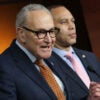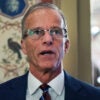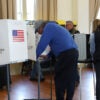At a Senate Judiciary Committee hearing to consider the nomination of Cornelia “Nina” Pillard, Senator Chuck Grassley (R–IA) questioned whether the Senate should confirm any additional judges to the D.C. Circuit.
Putting aside serious concerns about Pillard’s radical positions on sex education, abortion, and religious liberty, Republicans and Democrats have alternatively argued that the D.C. Circuit doesn’t need any more judges.
Congress has allotted eleven spots for full-time judges on the D.C. Circuit. There are currently eight active, full-time judges and six semi-retired judges (who make up the work of roughly 3.25 full-time judges). However, the D.C. Circuit’s caseload has been steadily decreasing over the past two decades.
This is not news to any members of the Senate Judiciary Committee. Over the years, both sides of the aisle have argued for the elimination of some seats on the D.C. Circuit. In a July 2006 letter, Democrats on the Senate Judiciary Committee wrote that a nominee to the D.C. Circuit “should under no circumstances be considered—much less confirmed—by this Committee before we first address the very need for that judgeship.” Seven years later, Senate Republicans are making the same case.
Prior to Pillard’s hearing this week, Senator Grassley sent a letter to the current judges on the D.C. Circuit, asking for their anonymous assessment of whether the court needs more judges. During the hearing, he recounted statements from the judges saying:
- “I do not believe the current caseload of the D.C. Circuit or, for that matter, the anticipated caseload in the near future, merits additional judgeships at this time.”
- “If any more judges were added now, there wouldn’t be enough work to go around.”
- “[O]ur docket has been stable or decreasing…[and] each judge’s work product has decreased from thirty-some opinions each year in the 1990s, to twenty-some, and even fewer than twenty, opinions each year since then.”
Reducing the number of seats on the D.C. Circuit would not discount the importance of that court. It is widely regarded as a stepping stone to the Supreme Court, and a considerable portion of its cases involve federal agencies—both of which are attractive reasons for Presidents to want to fill it up with judges of their choosing.
Grassley has introduced legislation that would reallocate three seats to other overworked circuit courts. Congress should use this opportunity to take a long, hard look at the allocation of judges among federal courts.































